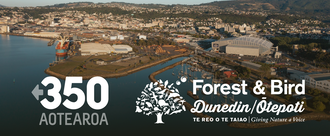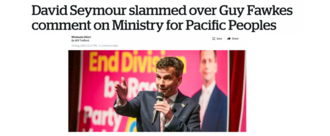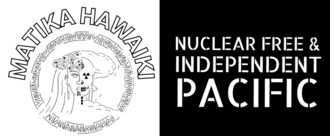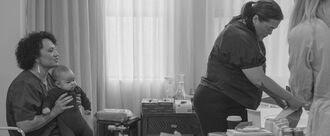-
Adopt the Zero Carbon Plan 2030Our city needs a plan to protect our people, our places, and the things we love from climate change. Dunedin City Councillors have the opportunity to do this by adopting the Zero Carbon Plan and working to achieve zero carbon by 2030. ➡️ Climate change threatens our very future. The Intergovernmental Panel on Climate Change (IPCC) warns of a “rapidly closing window of opportunity to secure a liveable and sustainable future for all” (1). To avoid the worst impacts of climate change, global warming must be limited to 1.5 degrees above pre-industrial levels. This means reducing our carbon emissions as soon as possible. ➡️ Mitigating the impacts of climate change demands urgent action. We must act now to reduce greenhouse gas emissions across all sectors. Although this may seem costly, the IPCC warns delaying action will create a false economy. Our savings now will mean future climate mitigation options become more costly and less effective. ➡️ There is a consequence to delay. If inaction causes us to overshoot the Paris Agreement target of net zero by 2050, the IPCC predicts that we risk triggering feedback loops that will be difficult - or impossible - to reign in. For Ōtepoti Dunedin, this means more extreme weather events, rising sea-levels, and more pressure on our native wildlife and ecosystems. Urgently reducing our carbon emissions is the right thing to do — for our community now and in the future. If Dunedin City Councillors choose to delay our zero carbon targets, we all pay the price. It will threaten our homes, livelihoods and even our lives. Dunedin’s Zero Carbon by 2030 goal means that we are working towards a livable and sustainable future and saving money in the long run. Kicking the can down the road puts that at risk. We simply can’t afford to wait. (1) AR6 Synthesis Report Summary for Policymakers: Climate Change 2023 (ipcc.ch/report/sixth-assessment-report-cycle).618 of 800 SignaturesCreated by Forest & Bird Dunedin

-
Deny Kelly-Jay Keen-Minshull Re-Entry Into AotearoaThis request is rooted not only in the impact of her visit in March this year, but also her extensive history of hateful speech and incitement of violence. Her return to Aotearoa would pose a significant threat and risk to public order and the public interest - this holds especially true for our takatāpui, transgender and gender diverse communities. Disinformation Project Researcher Dr Sanjana Hattouwa reported that after Keen’s visit to New Zealand, the amount of vitriol towards the trans community was “to a degree we’ve never studied before ” with “extraordinarily violent” content towards trans people being distributed widely. He described the level of hate towards trans people as “genocidal”. Outside of Aotearoa, Keen-Minshull’s public statements and actions have included: - Threatening that transgender people, gender diverse people, “and anyone else who stands in [her] way” will be “annihilated” - Stating trans men should be sterilised - Calling for men to carry guns to patrol women’s bathrooms against the imagined threat of trans women - Encouraging violent outbreaks at her tours in the UK and US, with her supporters allegedly assaulting counter protestors and inflicting violence on trans people - Organising rallies attended by members of the Proud Boys - a designated terrorist group in Aotearoa - Being excluded by other groups and members of her own anti trans circles because of her racism, Islamophobia and aforementioned ties to far-right white nationalism.* As the Minister for Immigration, Mr. Little, you have the right under s.16 of the immigration act 2009 to deny a visa, entry permission or entry waiver to a person likely to be a threat or risk to public order or to the public interest. The threshold for both appears to be low, considering that it was the same section used to bar the rap group Odd Future from Aotearoa in 2014. At the time, Immigration New Zealand said in a statement that their rationale for the ban under s.16 included "incidents at past performances in which they have cited violence." In an email dated 12 February 2014, obtained by Stuff as part of the OIA, Immigration NZ wrote: "[Odd Future] clearly has a history of promoting and inciting hatred…were they permitted to travel to New Zealand and perform I believe on the basis of their track record thus far, they are likely to incite violence towards women, racial, sexist and homophobic disharmony in New Zealand". Keen-Minshull is a person who causes demonstrable risk of harm to our public. Who employs hate speech and calls for violence against some of Aotearoa’s most vulnerable citizens. Whose public events have already caused disruption to public order here and overseas. TLA believes this justifies you, Minster Little, in exercising your powers under s.16 of the Act to deny her entry to Aotearoa, and for the safety of our trans citizens and the general public interest, we call on you to do so. Yours sincerely, Trans Liberation Alliance Sources: Posie Parker to return to NZ in September: Will Border Officers Let Her In? New Zealand Herald, 2 August 2023 https://www.nzherald.co.nz/nz/posie-parker-to-return-to-new-zealand-in-september-will-border-officers-let-her-in/QMFZ42LTVNFD7DS5KAF5C6URFQ/ Green Party Aotearoa Veale J, Byrne J, Tan K, Guy S, Yee A, Nopera T & Bentham R (2019). Counting Ourselves: The health and wellbeing of trans and non-binary people in Aotearoa New Zealand. Transgender Health Research Lab, University of Waikato: Hamilton NZ. https://researchcommons.waikato.ac.nz/bitstream/handle/10289/12942/Counting%20Ourselves_Report%20Dec%2019-Online.pdf?sequence=54%26isAllowed=y Anti Trans Hate in NZ becoming 'genocidal’ - One News, Friday, 5 May 2023 https://www.1news.co.nz/2023/05/05/anti-trans-hate-in-nz-becoming-genocidal-disinformation-project/ Why we need to protest Posie Parker, Redflag, 5 March 2023 https://redflag.org.au/article/why-we-need-protest-posie-parker4,013 of 5,000 SignaturesCreated by Trans Liberation Alliance

-
Keep this election free from violent speechElections are a time when our entire country comes together to decide on our political leadership. Everyone has a right to participate and share their view on the direction of our country, no matter their background. However, we are deeply concerned with your recent comments on NewstalkZB which incite violent rhetoric towards Pacific communities. You told listeners that in your fantasy you’d "send a guy called Guy Fawkes in there [The Ministry for Pacific Peoples] and it would be all over.” Threats of violence are not a “joke”. They can normalise violent behaviour and lead to fatal real-life repercussions. In fact, staff at the Ministry for Pacific Peoples had already been harassed at their workplace due to politicisation and race-baiting already aimed at their work. In 2022 you stated yourself, that violent rhetoric “does not belong in New Zealand politics”. Now we’re asking you to practice what you preach, retract your statement on NewstalkZB, apologise to the Ministry for Pacific Peoples and commit to an election free from violent speech. Elections should be a time when everyone can participate democratically, without their culture or workplace being threatened or insulted. Violent speech chips away at our democracy, when we need it to be stronger than ever. In a time of shared economic and climate crises, we need political leaders that are willing to respect people of all backgrounds, and refuse to stoke the fire of fear and division in Aotearoa New Zealand. ----- [1] Deputy PM Sepuloni blasts Seymour's Guy Fawkes 'joke' about Ministry for Pacific Peoples. Newshub, 17 August 2023: https://www.newshub.co.nz/home/politics/2023/08/deputy-pm-sepuloni-blasts-seymour-s-guy-fawkes-joke-about-ministry-for-pacific-peoples.html [2] Incident at Ministry of Pacific Peoples leaves staff rattled, police called in. Stuff, 18 August 2023 https://www.stuff.co.nz/national/politics/300952879/incident-at-ministry-of-pacific-peoples-leaves-staff-rattled-police-called-in [3] ACT Leader David Seymour slams Te Pāti Māori for 'threatening violence' in jokes about him. Newshub, 14 July 2022: https://www.newshub.co.nz/home/politics/2022/07/act-leader-david-seymour-slams-te-p-ti-m-ori-for-threatening-violence-in-jokes-about-him.html4,322 of 5,000 SignaturesCreated by Team ActionStation

-
Don't Subsidise Pollution: End Free Carbon CreditsSubsidising pollution in a climate crisis doesn’t make sense. When we all play our part in cutting climate pollution, then we can get further together, faster. But as cyclones and floods devastate communities across Aotearoa, the people in government are allowing large multinationals to have a free pass to pollute. Multinationals like Rio Tinto and Methanex are part of a select few corporations who produce 10% of Aotearoa’s climate pollution and get a $600 million a year subsidy to offset their emissions, in the form of free carbon credits. This encourages these companies to maintain business as usual, not to invest in decarbonisation. Under current legislation, these companies will still be getting free credits for decades to come, even after the whole country is meant to be at net zero emissions. Meanwhile, everyday households play their part by paying the carbon price in our petrol and electricity bills. This is increasingly putting the burden of action on individual households to try to meet our targets, while some of our biggest polluting industries continue to get a free pass to pollute. The good news is that with the right type of government support, the technology is there for industries currently getting free credits like steel, concrete and aluminium to transition. The recent announcement of NZ Steel’s decarbonisation plans with support from government shows that change is possible, and that free carbon credits are no longer needed. By ending free carbon credits, providing upfront loans for industries with decarbonisation options, and protecting domestic producers from more polluting competitors with a Carbon Border Mechanism, the government can accelerate emissions reductions and ensure every sector is taking responsibility for its pollution. We can protect jobs that are necessary for decarbonising the wider economy, while supporting a just transition for those in industries that don’t have a place in a climate safe future. Together we can create an industrial future for Aotearoa that is green, creates good jobs, and ensures a fair distribution of effort in cutting climate pollution. This petition is organised by Common Grace Aotearoa in collaboration with the NZ Green Building Council Te Kaunihera Hanganga Tautaiao, 350 Aotearoa, Greenpeace Aotearoa, Parents for Climate Aotearoa, Coal Action Network Aotearoa, Christian World Service, the Anglican Bishop of Wellington, Generation Zero, Climate Club, Engineers for Sustainable Development, and Oxfam Aotearoa.6,230 of 7,000 SignaturesCreated by Common Grace Aotearoa
-
Mental Health Policy Reform: An Open Letter to the GovernmentThe Mental Health Matters Initiative is a group of youth activists who have come together to fight for better mental health care in Aotearoa. We believe in the power of youth voice and experience and we are demanding the government to reform their Mental Health Policy. For years young people have been left to navigate an overworked and underfunded Mental Health System. Current and past Governments have handled the Mental Health Crisis with apathy, leaving behind a dysfunctional system. The Mental Health Matters Initiative holds a vision for what our mental health care system should look like (MHMI - Mission Statement): 1) Empathetic Providers and Leaders. We need empathetic leaders and mental health providers that work hard to ensure that every young person is able to access the care that they deserve, and understands the nuances and trials that come with every individual mental health journey. We need the Government to create policy that protects not only its patients needing care, but the workers who supply it. 2) Accessible Care. Everyone needs to be able to access the care that they need in a simple, stress-free way. We want to create viable pathways to care through policy and breaking Mental Health stigma. 3) Fair and Equitable Treatment. Access to treatment and care should be fair and equitable. Everyone should have access to the care that they deserve and that distribution of resources is fair on not only patients but workers. The current status-quo is not good enough. Experts, young people, workers, and those currently trying to navigate the system are demanding better. It is time to listen. We demand the government to implement these policies to ensure a functioning and supportive mental health system in Aotearoa.You have ignored us for too long, and this is a matter of life or death for many. Ngā Mihi, The Mental Health Matters Initiative231 of 300 SignaturesCreated by The Mental Health Matters Initiative

-
Upsize the celebration of te Reo with Mahuru MāoriTe Reo Māori - the Māori language forms a part of our unique identity and culture in Aotearoa New Zealand. It is one of the official languages of our country and as English is spoken every day, everywhere by everyone so should te reo Māori (with sign). A strategy to enable its growth was to have a concentrated period to celebrate and promote te reo māori, that is Te Wiki O Te Reo Māori - Māori language week and has been the case since 1975. Almost 50 years has passed and it's time to uplift the concentrated celebration and positive promotion of our Reo Māori - Māori language to further enable its growth to thrive and flourish, and its development as a language of value for all Aotearoa New Zealanders. It is what makes us uniquely different in the world. Making the official celebration for the month of Mahuru ( September) called Mahuru Māori will really boost the promise of a vibrant future for te reo Māori.547 of 600 SignaturesCreated by Danny Tahau Jobe
-
Protect families struggling with power pricesElectricity is an essential service, necessary for health and wellbeing. Most of us rely on it to stay warm, cook dinner, do our homework and keep the lights on. But lack of action from the regulator - the Electricity Authority, who sets the rules for electricity retailers - is causing unfair hardship. *** Disconnection and reconnection fees are adding debt to whānau already suffering. *** Prepay electricity is more expensive, even though many people who use prepay are doing so because they struggle to pay their bills and have no other option. *** The Consumer Care Guidelines, which are meant to protect vulnerable people, remain voluntary and retailers can ignore them. The Electricity Authority needs to protect people, especially the most vulnerable, by setting better rules for retailers. In 2022, electricity retailers disconnected at least 8,500 households on standard plans where people could not afford to pay their bills. (1) Retailers were then allowed to charge these households “disconnection fees” and “reconnection fees”, which can total over $200, pushing people further into debt. The majority of households who are disconnected then end up with no choice but to use prepay plans, on which overall costs are on average 13% higher than standard plans (2). These prepay users - some 30,000 households - are paying a premium for being poor. Consumer NZ estimates that each night, as many as 50 households on pre-pay are sitting without electricity because they can’t afford to top up (3). Official data about these prepay disconnections is not even recorded. The good news is that the Electricity Authority has the power to intervene. In December 2022, Parliament gave them an explicit objective to ‘protect the interests of domestic… consumers’ (ie households). No group deserves this protection more than the most vulnerable households. It is time for the Electricity Authority to use this power. We’re calling on them to: ***Protect consumers who are already struggling, by banning fees for disconnection/reconnection in cases of unpaid bills. ***End the ‘penalty for prepay’ by requiring retailers to publish prepay disconnection data and to ensure that prepay costs are no higher than their cheapest post-pay plan. ***Protect all consumers by making the full set of Consumer Care Guidelines mandatory, monitoring compliance and introducing penalties when retailers don’t follow the rules. This petition is organised by Common Grace Aotearoa in collaboration with Anglican Advocacy, the Salvation Army, FinCap, Community Law Centres o Aotearoa, Child Poverty Action Group, Consumer NZ, He Kāinga Oranga Housing and Health Research Group (University of Otago Wellington), Citizens Advice Bureau, Toast Electric, Sustainability Trust, NZ Council of Christian Social Services, Presbyterian Support, Family Works New Zealand, The Bishop's Action Foundation and United Community Action Network. We will deliver the petition to the Electricity Authority Board in 2024. Learn more, and get involved, at everyoneconnectednz.com. (1)Data received under the Official Information Act from the Electricity Authority. www.ea.govt.nz/documents/3370/9_June_2023.pdf (2,3)Consumer NZ analysis in June 2023. www.consumer.org.nz/articles/prepay-customers-paying-much-more-for-power Photo sourced from iStock.8,290 of 9,000 SignaturesCreated by Common Grace Aotearoa
-
Build public housing now!All people should have a secure and healthy home to live in. A place to come back to, for quiet and rest, a place to experience joy with friends and family, a place to feel grounded in community. But people in government having a hands off approach to the economy means it is geared towards protecting private profit – treating houses as commodities, rather than homes for living. Housing affects every part of our lives. The stress of hyper-short tenancies, week-to-week emergency housing grants, and the looming threat of rental increases pricing people out of their communities has a major impact on people’s wellbeing and working lives. Public housing can provide stable and safe homes for people, yet successive governments have neglected the state housing programme, choosing to privatise and commodify houses instead of ensuring everyone has a home. [1] Real estate magnates are extracting profits while everyday people are being locked out of homes. We need a bold plan out of this crisis, not piecemeal change and band aid solutions. An ambitious and significant public housing programme is a proven way of truly addressing the issue of housing. In Aotearoa, this must happen alongside a Te Tiriti based housing system where Māori have tino rangatiratanga over housing. Government neglect of public housing impacts everyone. Forty years ago, it was possible for a family to buy a home because household income was equal to the average house price in Aotearoa. Today, families need eight times their household income to buy a house.[2] If the government takes action to prioritise public housing, it can create the conditions where housing will be more affordable for everyone. 1 in 4 renters spend 40 percent or more of their income just on rent. [3] Health care workers and teachers are being priced out of their communities. [4] If we had more public homes available to more people in more areas of Aotearoa it increases people's opportunities to lead thriving lives - teachers can walk to their local schools to educate your kids, and health care workers to our hospitals to care for your loved ones. By the government’s own criteria we have nearly 30,000 people and families waiting for homes right now. [5] But if we consider all the people and families living in unaffordable, uninhabitable and insecure housing who don’t meet the government’s criteria – the need for a build and buy programme able to house everyone becomes abundantly clear. We know from research there are 105,747 people struggling with some form of homelessness or housing deprivation.[6] There are also 346,998 people who are reliant on Accommodation Supplements because they cannot afford homes. This starts to paint a picture of a ‘true waitlist’ that could really benefit from more good quality, affordable public homes. Right now, the government spends millions of dollars a week on the accommodation supplement, and emergency housing. These mechanisms are ways the government subsidise the profits of private landlords and moteliers who can charge exorbitant prices and raise this at will. Instead of doing this, the government can choose to prioritise building and buying public homes, rather than propping up property magnates and corporate profits. Aotearoa New Zealand is falling behind when it comes to public housing, making up just 3.8% of all homes, far behind the UK at 17%; and Austria, Denmark and the Netherlands all above 20%. [8] Countries with higher public housing and more generous eligibility criteria have better housing outcomes for people and families. Public housing is infrastructure for care, connection, cohesion and contribution. We need the Government to look after all of our long-term wellbeing by building and buying more public homes to house everyone. Public Housing Futures (PHF) is a group made up of Aotearoa based researchers and organisers who believe that everyone in Aotearoa should have access to beautiful, accessible, sustainable and secure housing, and that public housing is a pathway towards this. ActionStation has teamed up with Public Housing Futures to work on this campaign. 1. Kāinga Kore: The Stage One Report of the Housing Policy and Services Kaupapa Inquiry on Māori Homelessness. Waitangi Tribunal - WAI 2750, 2023 https://forms.justice.govt.nz/search/Documents/WT/wt_DOC_197630281/Kainga%20Kore%20W.pdf 2. Generation Rent: Rethinking New Zealand’s Priorities. Eaqub and Eaqub, 2015; New Zealand house prices drop again but still out of reach for first-time buyers. Guardian, 10 May https://www.theguardian.com/world/2023/may/10/new-zealand-house-prices-drop-again-but-still-out-of-reach-for-first-time-buyers 3. Housing affordability more challenging for renters than homeowners. Stats NZ, accessed Jul 2023 https://www.stats.govt.nz/news/housing-affordability-more-challenging-for-renters-than-homeowners/#:~:text=In%20the%20year%20ended%20June,released%20by%20Stats%20NZ%20today 4. Housing costs driving teachers, aged care nurses away from cities that need them. Stuff, Aug 2021 https://www.stuff.co.nz/business/126061577/housing-costs-driving-teachers-aged-care-nurses-away-from-cities-that-need-them Public Housing Quarterly report. HUD, March 2023 https://www.hud.govt.nz/assets/Uploads/Documents/Public-Housing/HQR-Mar23-web-V2.pdf 5. Public Housing Quarterly report. HUD, March 2023 https://www.hud.govt.nz/assets/Uploads/Documents/Public-Housing/HQR-Mar23-web-V2.pdf 6. Severe housing deprivation in Aotearoa New Zealand. Amore et al., 2018 (updated Jun 2021) https://www.hud.govt.nz/assets/Uploads/Documents/Severe-Housing-Deprivation-2018-Estimate-Report.pdf 7. Over 100,000 people are in severe housing deprivation and struggling to access a home. Human Rights Commission, accessed July 2023 https://housing.hrc.co.nz/over_100_000_people_in_severe_housing_deprivation_and_struggling_to_access_a_home#:~:text=A%202022%20OECD%20report%20found,OECD%20average%20of%207%20percent3,218 of 4,000 SignaturesCreated by Public Housing Futures
-
Oppose AUKUS: For an independent, demilitarised and nuclear-free PacificAUKUS is an aggressive military pact. Security in New Zealand and the Pacific can only be ensured by centring sustainable development, Indigenous rights, and environmental protection. AUKUS makes the world more dangerous. New Zealand participation in AUKUS would deepen geopolitical tensions in the Pacific, and threaten Pacific nations’ long held policy of “friends to all and enemies to none”. AUKUS impedes climate action. Climate change remains the single greatest threat to the livelihoods, security and wellbeing of all peoples of the Pacific. The threat of climate change requires international diplomacy and cooperation, not militarism. AUKUS threatens our nuclear free legacy. Aotearoa New Zealand has a proud history of anti-nuclearism and solidarity with the Nuclear Free and Independent Pacific movement. AUKUS is not based on public consultation. It accelerates climate injustice, violates our treaties and regional commitments, and erodes regional decolonisation efforts. We urge the New Zealand government to reject any role in the AUKUS military pact and condemn the use of nuclear weapons and non-peaceful nuclear technologies in the Pacific. We urge the New Zealand government to recommit to an Independent and Pacific-led foreign policy, in accordance with Te Tiriti o Waitangi, our regional obligations, and our national identity. This petition is led by Te Kuaka. More information on MATIKA HAWAIKI campaign events can be found here: http://tinyurl.com/matikahawaiki More information on AUKUS can be found here: https://docs.google.com/document/d/1fz3DaAXmcll7U-C6Fd063VVq-C37sLgzNPlXFdghl1k/edit692 of 800 SignaturesCreated by Te Kuaka (NZ Alternative)

-
Rule out Residences: Let's do better for our kidsTime and time again, we have reports that tell us Oranga Tamariki residences are not fit-for-purpose and are not meeting the therapeutic needs of children under their care. Many organisations and individuals have raised concerns about Oranga Tamariki residential care. Still, the urgency of these concerns continues to go unaddressed. This is not just a question of which government department is in charge. It is time these facilities are replaced with a new, more effective system that is fundamentally redesigned to centre the complex needs of the children and young people in their care. Our current system is causing more harm to communities by failing to address the underlying issues that lead to children and young people requiring residential care. Punitive “Tough in crime” approaches to youth crime are holding our country back. We need to build paths that lead young people to better outcomes and address reasons for reoffending by understanding and overcoming issues in a young person's life. It is time these facilities are replaced with a new, more effective system. New Zealand needs a system in which young people who require care or have offended are being met with rehabilitation and therapeutic methods. We need resources and pathways that help prevent offendings, such as mental health support, educational support and addiction services. Our communities deserve to have preventative services to ensure we solve the underlying issues that are causing harm. We want to see whānau and community focused solutions making them less reliant on state care. Having the current workforce trained and upskilled in therapeutic and trauma informed practices will help them support the communities in need better. We also ask for transparency and accountability from those on top so that when things go wrong policies are set in place that allows for real change to happen We all want to see our youth thriving and right now they need our support because the current system is failing them. We ask the Government to do better for the next generation and create new community focused rehabilitation services. References and further reading: 1. Report: How we fail children who offend and what to do about it: ‘A breakdown across the whole system’: https://www.borrinfoundation.nz/wp-content/uploads/2022/04/Children-Who-Offend-Final-research-report-March2022.pdf 2. Ko Te Wā Whakawhiti, It’s Time for Change - A Māori Inquiry into Oranga Tamariki https://whanauora.nz/publications/ko-te-wa-whakawhiti 3. Young Adults in the Criminal Justice System in Aotearoa New Zealand Young-Adults-in-the-Criminal-Justice-System-in-Aotearoa-NZ-report.pdf (borrinfoundation.nz) 4. John Campbell on OT youth justice: 'Most of us will never meet kids this broken' https://www.1news.co.nz/2023/07/05/john-campbell-on-ot-youth-justice-most-of-us-will-never-meet-kids-this-broken/400 of 500 SignaturesCreated by Just Speak
-
Keep Nga Hau Māngere Birthing Centre openWhere a gap once existed, this state of the art centre has served many whānau, aiga & families. Over 860 babies have been born there. Thousands of women have experienced vital support via labour cares, antenatal clinics, lactation consultant appointments, contraception and birth education/hapū wānanga. 75% of women birthing at Nga Hau Māngere identify as Māori and/or Pasifika. Research has shown that in the first 2000 days Māori and/or Pasifika have preventable, inequitable experiences. Pregnant Māori and/or Pasifika have the highest death rates and are less likely to receive specialist care. Nga Hau Māngere is an already 'up–and–running' solution aligning with new health reforms under Te Whatu Ora's Te Pae Tata (2022). "Kahu Taurima | Maternity and early years" is 1 of the 5 priority actions this government plan (under priority action 1 ‘place whānau at the heart of the system to improve equity and outcomes’). The local community have spoken of how important the centre is: "Māmā in South Auckland deserve the best care while they are pregnant. Speaking from experience Nga Hau Birthing Centre was exactly that for me. They were amazing from the beginning until the end... I truly believe that if I had been with Nga Hau for my first pregnancy it would not have been so traumatic." "Our experience at Nga Hau truly set (us) up for success when we took our baby home. We were as rested as we could be and I was given all the help they had to offer to start our breastfeeding journey... I’ve always had such a sense of calm and a strong feeling of safety when walking through those doors. Mothers deserve to birth at Nga Hau and Mangere/South Auckland deserves to have this incredible facility in our backyard." "All in all a 10/10 experience for me... I pray to God that this place stays so that midwives are able to birth more of mine and other ladies' babies!" Nga Hau Māngere provides an essential service to the community and the Government needs to ensure funding is provided so it can remain open.9,218 of 10,000 SignaturesCreated by Rebecca Kingi
-
Make tertiary education accessible: study wage for all1. Learning is an inherently valuable contribution to society. To genuinely acknowledge education as a public good, we must value not only our educators, but also the students. 2. The current means-testing of the student allowance scheme exacerbates student poverty and is too flawed to truly ensure equity and fairness to marginalised groups. 3. We want to stop the downward trend of students dropping out because they can’t afford to keep studying. We need more students, including those who otherwise could not afford to study, in tertiary education so we have citizens prepared for an increasingly complex world. 4. Tertiary education is not just an investment into the individual, but to their whānau, community and Aotearoa. 5. Pre-1990, Aotearoa had relatively universal student allowances, and free tuition. Overseas, since 1996, Denmark has provided a universal student allowance too (which was 860 euros per month in 2022). Our own history and Denmark prove that a Study Wage for All is entirely possible. Normalised student poverty is not inevitable, it is a political choice. There are no more excuses to keep putting student poverty on the back burner. Barrier-free education is a public good that benefits our collective future. A Study Wage for All is critical to achieving this. Reference: * Calculations for a Universal Student Allowance prepared by the Parliamentary Library using HYEFU 2022 (at p148), the Ministry of Social Development’s Monthly Benefits Update – March 2023, current minimum wage rates, and StudyLink Statistics (2022).1,831 of 2,000 SignaturesCreated by OUSA and VUWSA




.png)


.png)





